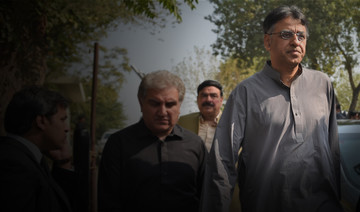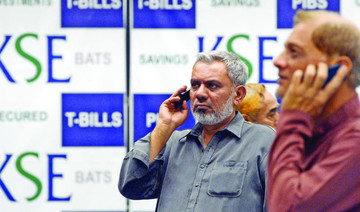ISLAMABAD: Exporters and businessmen on Thursday expressed optimism that the new tax incentives introduced in the mini-budget for industry, stock market and agricultural sector would lead to the revival of the economy and boost exports.
Finance Minister Asad Umar on Wednesday presented the third finance bill for the current fiscal year in the National Assembly of Pakistan, claiming it would boost investment, manufacturing and exports, and facilitate agricultural financing to promote economic activities in the country.
Reacting to the incentives introduced in the budget, Chairman Pakistan Apparel Forum, Javed Balwani, said that the liquidity problem of the export-oriented industry will be addressed if the government – as promised in the mini-budget — issues them promissory notes as a refund for withholding tax amounting to around Rs200 billion.
“This is for the first time in a decade that a government has promised to clear all our outstanding dues in one go. This is going to be a major relief to the industry,” he told Arab News.
Balwani said the promissory notes and abolition of withholding tax on banking transactions would help revive the economy and boost exports. He also hailed the government for allocating separate electricity and gas tariffs for the industry.
Stockbrokers said the new incentives and reduction in different taxes would contribute toward ease of doing business.
“We accentuate that with this budget, the government has underpinned support for the domestic industry, incentivize export-oriented sectors to boost trade and improve ease of doing business in the country,” Head of Research Arif Habib Limited Samiullah Tariq told Arab News.
“Proposals put forth by the broker community have also been accepted and steps would now be put in place to improve sentiment and encourage volumes at the index,” he said.
“The removal of 0.02 percent advance tax on the sale and purchase of shares, collected from brokerages, will increase trading activities in the market,” he added.
Ahmed Hassan Moughal, President Islamabad Chamber of Commerce and Industry, said that the tax reduction on agricultural sectors and Small Medium Enterprises (SMEs) is expected to revolutionize the economy as both of them are considered to be the backbone of the financial system.
“Basically the government has introduced major reforms in the taxation system to fix the past anomalies, but it will take some time to see overall positive impact of all these measures on the industry and exports,” he told Arab News.
On Wednesday, the finance minister also announced that he would present the “Medium Term Economic Framework” in parliament next week to boost investment, manufacturing and agricultural produce in the country.
“We are committed to helping the deprived segment of the society and it is our constitutional responsibility to bridge the gap between the rich and the poor,” he said.
Umar said that his government had identified four variables to fix Pakistan’s ailing economy. These included: balancing government’s revenues and expenses; increasing exports that recently plummeted from 14 percent of the GDP to seven percent; encouraging foreign direct investment; and boosting national savings from 10.4 percent which, he added, were the lowest in the world.
To achieve all these targets, he announced plans to slash tax on SMEs and agricultural loans from 39 percent to 20 percent, abolish withholding tax on banking transactions for tax filers, and remove import duty on newsprint.
He said that duty on diesel engines for agricultural purposes was also decreased to five percent. Other than that, abolition of the Gas Infrastructure Development Cess on fertilizers would help reduce prices of urea for 200 rupees per bag.
Following the approval of the Finance Supplementary (second amendment) Bill 2019, non-tax filers will be able to purchase cars up to 1300cc, though the tax will be increased for them.
The minister announced plans to abolish super tax for non-banking companies and on bids for sports franchises until profitability, while withholding tax on trading in the stock exchange, he said, had also been abolished.
Exporters, businessmen jubilant after government’s reforms package
Exporters, businessmen jubilant after government’s reforms package
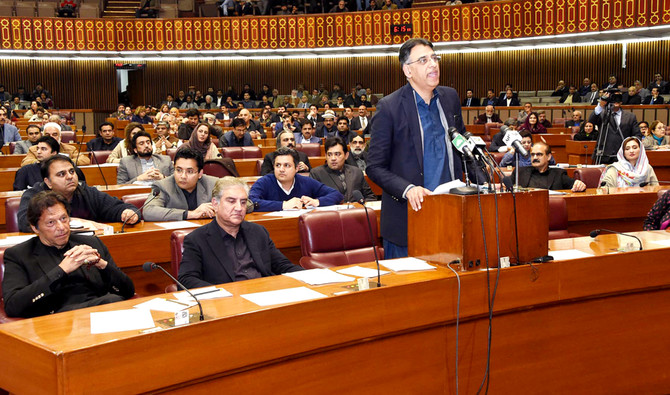
- Promissory notes to solve liquidity problem of export-oriented industry
- Positive impact of tax incentives on industry will take some time
Pakistan top court suspends verdict denying reserved parliamentary seats to Khan-backed party

- Under election rules, parties are allotted reserved seats in proportion to number of parliamentary seats they win in polls
- Election Commission ruled in March Khan-backed SIC was not eligible for reserved seats, Peshawar High Court upheld ruling
ISLAMABAD: Pakistan’s top court on Monday suspended a verdict by the Peshawar High Court (PHC) that a party aligned with candidates backed by former premier Imran Khan was not eligible for reserved seats in the legislature, a blow for the country’s coalition government headed by Prime Minister Shehbaz Sharif.
Khan’s Pakistan Tehreek-e-Insaf (PTI) party couldn’t contest the Feb. 8 elections under its traditional electoral symbol, a cricket bat, which it was denied on technical grounds. The PTI subsequently struck an alliance with another party, the Sunni Ittehad Council (SIC), in a bid to secure reserved seats for women and minorities in parliament.
Under Pakistan’s election rules, political parties are allotted reserved seats in proportion to the number of parliamentary seats they win in the election. This completes the National Assembly’s total strength of 336 seats.
The Election Commission had ruled in March that the SIC was not eligible for reserved seats, a decision the alliance had appealed in the PHC, which also rejected it. The SIC then approached the Supreme Court to appeal the high court’s decision.
A three-member bench of the top court took up the SIC’s petition for hearing on Monday.
“The Supreme Court has suspended the Election Commission’s order and the Peshawar High Court’s order,” PTI Chairman Gohar Khan, who is also Khan’s lawyer, told reporters outside the top court after it rejected the PHC verdict. “This is a vindication of our stance.”
He said the Supreme Court had also barred members of other political parties elected on reserved seats that should have been allotted to the SIC from casting their votes for or against any legislation.
The PTI leader said the SIC had been deprived of 67 reserved seats for women and 11 parliamentary seats for minorities. After losing 78 reserved seats, PM Sharif’s coalition government had lost its two-thirds majority, he added.
Khan, who is in jail following a string of convictions, and his PTI say the party was stripped of its bat symbol as a ruse to undermine its popularity and keep it from winning a maximum number of seats in general elections.
In February, an agreement between Bhutto Zardari’s Pakistan Peoples Party (PPP) and the Pakistan Muslim League-Nawaz (PML-N) of three-time Premier Nawaz Sharif ended days of uncertainty and negotiations after the Feb. 8 elections produced a hung national assembly.
The PML-N’s 79 and the PPP’s 54 seats together made a simple majority in parliament to form a government and they also roped in smaller parties in the coalition.
Candidates backed by Khan won 93 seats but did not have the numbers to form a government. He and his party have rejected the results of the elections, alleging widespread rigging.
Pakistan’s benchmark share index rises as much as 1.5%
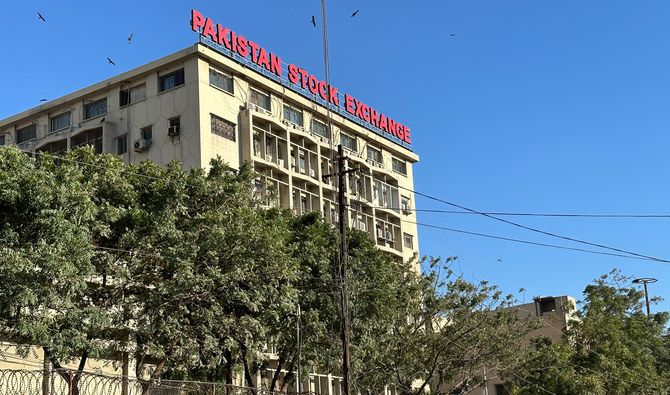
- Pakistan’s benchmark share index has surged 73.4% over the past year, up 12.9% year-to-date
- Market reacting to Saudi business delegation’s arrival, IMF statement on mission visit, says analyst
KARACHI: Pakistan’s benchmark share index rose 1.5% during intraday trade on Monday, to an intraday high of 72,986 points.
The index has surged 73.4% over the past year and is up 12.9% year-to-date.
A Saudi delegation arrived in Pakistan on Sunday for talks on trade and investment opportunities, particularly in the exploration and production sectors.
Adnan Sheikh, assistant vice president at Pak Kuwait Investment Company, said the market was up following news of the delegation’s arrival along with an IMF statement regarding a mission visit.
“The PSX is still very cheap with price to earnings ratio of under 5x compared to average of 8x,” Sheikh added.
Pakistan last month completed a short-term $3 billion program, which helped stave off sovereign default, but the government of Prime Minister Shehbaz Sharif has stressed the need for a new longer term program.
An International Monetary Fund mission is expected to visit Pakistan this month to discuss a program, the lender said on Sunday ahead of Islamabad beginning its annual budget-making process for the next financial year.
The IMF did not specify the dates of the visit, nor the size or duration of the program.
Earlier, in an interview with Reuters, Finance Minister Muhammad Aurangzeb said the country hoped to agree the outlines of a new IMF loan in May.
Pakistan is expected to seek at least $6 billion and request additional financing from the Fund under the Resilience and Sustainability Trust.
Saudi officials arrive in Karachi to carry out immigration procedures under Makkah Route Initiative

- Makkah Route Initiative allows for completion of immigration procedures at pilgrims’ country of departure
- A total of 65,000 pilgrims in Karachi, Islamabad are expected to utilize Makkah Route Initiative during this year’s Hajj
ISLAMABAD: Saudi officials arrived in the southern port city of Karachi on Monday to carry out immigration procedures under the Makkah Route Initiative for Hajj pilgrims, the Pakistan Civil Aviation Authority (PCAA) said.
Pakistani officials confirmed in April Saudi Arabia’s decision to approve the Makkah Route Initiative’s expansion to the airport in Karachi, the country’s most populous city. Launched in 2019, the program was initially extended only to the airport in Islamabad.
The Makkah Route Initiative allows for the completion of immigration procedures at the pilgrims’ country of departure, making it possible to bypass long immigration and customs checks on reaching Saudi Arabia. The facility significantly reduces waiting times and makes the entry process smoother and faster.
“A group of 44 Saudi immigration officials has arrived in Karachi as part of the Road to Makkah Project,” PCAA said in a statement. “The immigration team will carry out Saudi immigration procedures for Hajj pilgrims at Karachi airport who are traveling under the Road to Makkah Project.”
The Saudi immigration officials were welcomed by the acting counsel general of Saudi Arabia in Karachi, the director of Hajj in Pakistan, representatives of the Airport Security Force, Pakistan Customs, Anti-Narcotics Force, Border Health Services, and the Federal Investigation Agency.
Pakistan’s religious affairs secretary told a media briefing in April that a total of 65,000 Hajj pilgrims would utilize the Makkah Route Initiative at Karachi and Islamabad airports this year. The official said 41,000 of the 65,000 pilgrims will make use of the facility under the government’s Hajj scheme, while the remaining 24,000 will rely on private tour operators.
A total of 29,500 pilgrims will use the facility from Islamabad while 35,500 will be able to avail it from the Jinnah International Airport in Karachi.
Saudi Arabia last year restored Pakistan’s pre-pandemic Hajj quota of 179,210 pilgrims and abolished the upper age limit of 65. More than 81,000 Pakistani pilgrims performed Hajj under the government scheme in 2023, while the rest used private tour operators.
Pakistan will launch Hajj 2024 operations from May 9 in eight airports across the country till June 9. This year’s pilgrimage is expected to take place from June 14-19.
Pakistan wants ‘larger, longer’ IMF bailout, PIA privatization by early July — FinMin
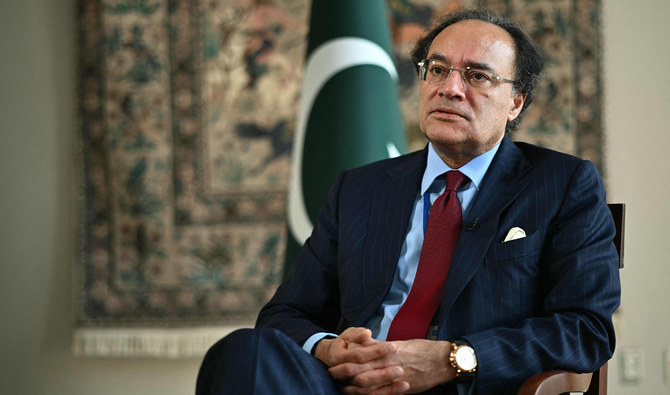
- Pakistan last month completed a short-term $3 billion program that helped stave off sovereign default
- Finance minister says hopeful PIA and other privatization deals would get through “finishing line” by early July
ISLAMABAD: Finance Minister Muhammad Aurangzeb said on Monday Islamabad was seeking a “larger and longer” bailout program from the International Monetary Fund, whose mission would arrive in Islamabad within the next ten days to start discussing a new loan deal.
Pakistan last month completed a short-term $3 billion program, which helped stave off sovereign default, but the government of Prime Minister Shehbaz Sharif has stressed the need for a fresh, longer term program.
Pakistan’s financial year runs from July to June and its budget for fiscal year 2025, the first by Sharif’s new government, has to be presented before June 30.
The IMF has not specified the dates of its Islamabad visit, nor the size or duration of any new program.
“We have requested the IMF … that we want to go into a larger and a longer program with the fund and they have acceded that request, and we are expecting the mission to arrive here within a week to 10 days, where we will start discussing the contours of the next program,” Aurangzeb said while addressing a conference in Islamabad.
He said Pakistan needed a new IMF program to bring “permanence” to macroeconomic stability and continue to carry out “structural reforms.”
The IMF has said accelerating reforms was more important than the size of a new program, which would be guided by a package of reforms and balance of payments needs.
Under the last $3 billion bailout, Pakistan implemented several IMF-mandated reforms, such as budget adjustments, increasing interest rates, and higher energy prices.
Among expected reforms under a new program are strengthening public finances through gradual fiscal consolidation, broadening the existing tax base and improving tax administration, and debt sustainability, all while protecting the vulnerable.
Pakistan also needs to restore the viability of the energy sector and prevent further accumulation of circular debt arising from subsidies and unpaid bills. Other reforms will include cutting inflation, stimulating private sector growth and adopting a market-driven exchange rate to help balance external accounts and rebuild foreign reserves.
PIA PRIVATIZATION
“We have to broaden our tax base,” the finance minister said, outlining reforms under new IMF deal. “Our tax to GDP [ratio] is languishing at about 9 percent ... we have to start moving it toward 14- 15 percent.”
“We have to start resolving the complex energy equation … And the third one is the SOE [state-owned enterprises] reform,” Aurangzeb said. “Our prime minister has been very clear that the government has no business being in business … We need to and we will accelerate the privatization agenda.”
He said he hoped that PIA, the national carrier, and other privatization deals would get through the “finishing line” by early July.
Last week, Pakistan pushed back the deadline for companies to express interest in buying PIA to May 18, a day before the expressions had originally been due. The privatization commission says 10 companies have already expressed an interest.
Pakistan’s government has previously said it was putting on the block a stake of between 51 percent and 100 percent in the loss-making airline.
The disposal of the flag carrier is a step that past elected governments have steered away from as it is likely to be highly unpopular, but progress on privatization is key to helping cash-strapped Pakistan pursue further funding talks with the IMF.
At OIC contact group meeting, Pakistan calls on India to restore Kashmir’s special status

- Delegations from Pakistan, Saudi Arabia and other member states attend OIC Contact Group on Jammu and Kashmir meeting in Banjul
- Member states call for early and peaceful resolution to Kashmir dispute along the lines of OIC’s agenda UN resolutions, says foreign ministry
ISLAMABAD: Pakistan’s Deputy Prime Minister and Foreign Minister Ishaq Dar stressed on India to release prisoners, lift curbs on political parties and restore the special status of the internationally disputed Jammu and Kashmir territory, the foreign ministry said on Monday, during the sidelines of the Organization of Islamic Cooperation’s (OIC) summit in The Gambia.
These views were expressed by Dar as he led Pakistan’s delegation to a meeting of the OIC’s Contact Group on Jammu and Kashmir on Sunday in Banjul. The meeting reviewed the political and security environment in Jammu and Kashmir, and took stock of the “grim human rights situation” in the territory, Pakistan’s Ministry of Foreign Affairs (MoFA) said. The meeting was attended by member states of the contact group such as Saudi Arabia, Türkiye, Niger, Azerbaijan and officials of the OIC-Independent Permanent Human Rights Commission.
Kashmir has long been a flashpoint between India and Pakistan, both of which claim all of the region but administer only parts of it. On Aug. 5 2019, Indian Prime Minister Narendra Modi withdrew Indian-administered Kashmir’s autonomy in a move that was seen by analysts as a strategy to tighten his grip over the territory. The decision provoked outrage in Pakistan and the downgrading of diplomatic ties and suspension of bilateral trade between the two countries.
“He [Dar] also stressed that India must release all the political prisoners, lift curbs on the outlawed political parties, revoke the illegal and unilateral actions of 5 August 2019 and the subsequent steps aimed at demographic change and political engineering, and implement the relevant UN Security Council resolutions,” MoFA said.
Dar informed the group that India was “systematically denying the Kashmiri people their fundamental rights and freedoms,” adding that Indian authorities had created “an environment of fear and intimidation” in the disputed territory.
The delegations from member countries stressed the importance of the resolution of the Kashmir dispute along the lines of the OIC’s agenda, the foreign ministry said. They expressed support for the legitimate struggle of Kashmiris for the realization of their right to self-determination in accordance with the relevant UN Security Council resolutions, the ministry said.
“They called for an early and peaceful resolution of the Jammu and Kashmir dispute,” MoFA said.
The OIC has 57 member countries, making it the second largest intergovernmental organization after the United Nations. The OIC contact group on Jammu and Kashmir was established in 1994 to support the struggle of the people of Indian-administered Kashmir, including their right to self-determination, to voice the organization’s position, and coordinate joint actions on the dispute.
Dar is in Banjul to attend an OIC summit being held against a backdrop of widespread anger over Israel’s military actions in Gaza. The Jewish state has killed nearly 35,000 Palestinians and caused massive destruction of hospitals, schools and residential neighborhoods in the densely populated area since Oct. 7.
The Pakistani deputy prime minister arrived in Gambia on Wednesday to present his country’s perspective on a wide range of issues, including the war in Gaza and the rights situation in Indian-administered Kashmir.


